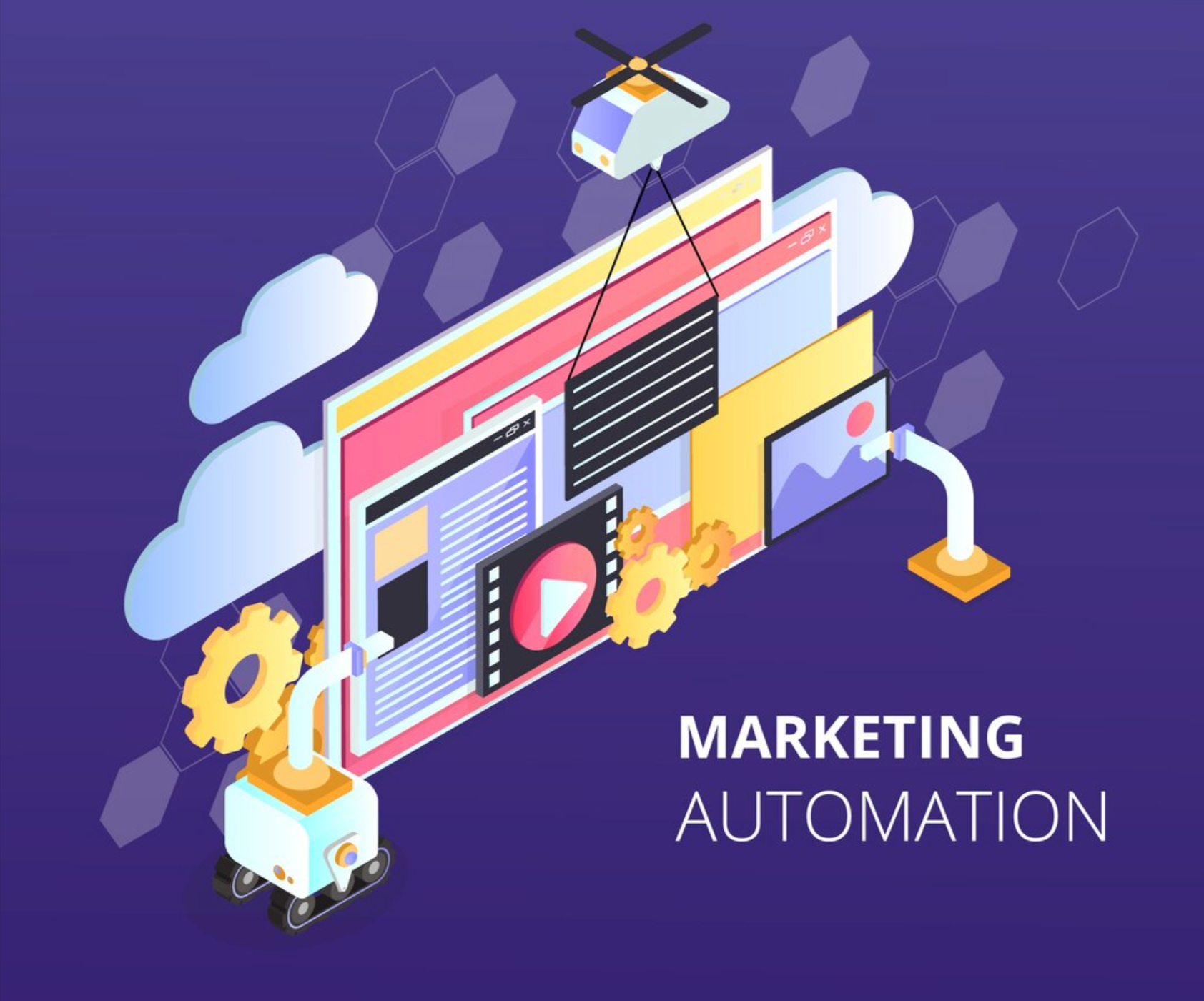Marketing automation refers to the use of software platforms and technologies designed to automate repetitive marketing tasks. These tools help businesses streamline their marketing efforts, manage multiple campaigns efficiently, and personalize communications at scale.

Historical Background of Marketing Automation
The concept of marketing automation began in the late 1990s, evolving from email marketing tools to sophisticated platforms capable of handling complex marketing strategies. The early 2000s saw the rise of comprehensive CRM systems, which further integrated marketing automation functionalities, paving the way for today’s advanced solutions.
Read – A Comprehensive Guide to Video Marketing
Importance of Marketing Automation in Today’s Business Environment
In the current digital landscape, marketing automation is crucial for businesses aiming to stay competitive. It allows companies to engage with customers in a personalized manner, optimize marketing strategies through detailed analytics, and enhance overall productivity by automating time-consuming tasks.
Types and Categories
Email Marketing Automation
Email marketing automation involves sending targeted emails to subscribers based on predefined triggers. This could include welcome emails, follow-ups, or promotional offers, tailored to the recipient’s behavior and preferences.
Social Media Marketing Automation
This type of automation schedules and publishes content across various social media platforms, tracks engagement metrics, and manages social media ad campaigns, ensuring a consistent online presence without manual intervention.
CRM Automation
Customer Relationship Management (CRM) automation integrates marketing efforts with sales and customer service processes. It helps manage customer interactions, track sales pipelines, and automate follow-ups, ensuring a seamless customer experience.
Lead Nurturing Automation
Lead nurturing involves developing relationships with potential customers throughout their buying journey. Automation in this area ensures timely and relevant communications, guiding leads towards conversion.
Analytics and Reporting Automation
Automated analytics and reporting tools gather data from various marketing activities, providing real-time insights and detailed reports. This helps marketers measure campaign performance and make data-driven decisions.
Key Features of Marketing Automation
Lead Scoring and Segmentation
Marketing automation platforms use lead scoring to rank prospects based on their interactions and behaviors. Segmentation allows marketers to categorize leads into different groups, enabling more targeted and effective campaigns.
Drip Campaigns
Drip campaigns involve sending a series of automated emails to prospects over time. These campaigns are designed to nurture leads by providing valuable content and moving them through the sales funnel.
Behavioral Tracking
Behavioral tracking monitors how users interact with a brand’s website, emails, and social media. This data helps marketers understand user preferences and tailor communications accordingly.
Personalization
Personalization features in marketing automation tools allow for the customization of messages based on user data. This leads to more relevant and engaging interactions, improving the overall customer experience.
Integration with Other Tools
Effective marketing automation platforms integrate seamlessly with other business tools, such as CRM systems, e-commerce platforms, and social media networks, creating a cohesive marketing ecosystem.
Benefits of Marketing Automation
Efficiency and Productivity
- Time-saving Aspects – By automating repetitive tasks such as email marketing, social media posting, and lead nurturing, marketing automation saves significant time for marketers. This allows them to focus on more strategic activities that require human creativity and insight.
- Streamlined Processes – Automation streamlines various marketing processes, reducing the complexity of campaign management. This ensures that marketing activities are executed consistently and accurately.
- Reduction in Manual Errors – Automating tasks minimizes the risk of human errors, ensuring that campaigns are executed flawlessly and data is accurately captured and analyzed.
Enhanced Customer Experience
- Personalized Communication – Marketing automation enables personalized communication at scale. By leveraging customer data, businesses can send tailored messages that resonate with individual preferences and behaviors.
- Timely Responses – Automated systems can respond to customer inquiries and actions instantly, providing timely information and support. This enhances the customer experience and increases engagement.
- Consistent Messaging – Automated campaigns ensure that messaging remains consistent across all channels and touchpoints, reinforcing brand identity and building trust with customers.
Improved Lead Management
- Better Lead Scoring – Automation tools use sophisticated algorithms to score leads based on their interactions and behaviors. This helps prioritize high-quality leads for the sales team, improving conversion rates.
- Efficient Lead Nurturing -Automated lead nurturing campaigns ensure that prospects receive relevant and timely content throughout their buying journey, guiding them towards making a purchase decision.
- Increased Conversion Rates – By delivering personalized and timely communications, marketing automation helps convert leads into customers more effectively. This results in higher conversion rates and improved sales performance.
Detailed Analytics and Reporting
- Real-time Data Tracking – Automated systems provide real-time tracking of marketing activities, allowing marketers to monitor performance and make adjustments on the fly.
- Insightful Reports – Detailed reports generated by automation tools offer valuable insights into campaign performance, customer behavior, and ROI. This data-driven approach helps optimize marketing strategies.
- Performance Measurement – Automation platforms measure the effectiveness of marketing efforts, providing metrics such as open rates, click-through rates, and conversion rates. This helps marketers assess the success of their campaigns and make informed decisions.
Cost-Effectiveness
- Reduced Operational Costs – By automating routine tasks, businesses can reduce the need for extensive marketing staff, lowering operational costs.
- Better ROI – Marketing automation improves the efficiency and effectiveness of campaigns, leading to better ROI. By reaching the right audience with the right message at the right time, businesses can maximize their marketing budget.
- Scalability of Marketing Efforts – Automation allows businesses to scale their marketing efforts without a proportional increase in resources. This is particularly beneficial for growing companies that need to expand their marketing reach.
Challenges and Limitations
- Initial Setup Costs – Implementing marketing automation can be costly initially, requiring investment in software and training. However, these costs are often offset by the long-term benefits.
- Complexity of Implementation – Setting up and managing marketing automation systems can be complex, requiring technical expertise and ongoing maintenance.
- Data Privacy Concerns – With the increased use of customer data, businesses must ensure compliance with data privacy regulations. This involves implementing robust security measures and obtaining proper consent from users.
Latest Innovations in Marketing Automation
- AI and Machine Learning Integration – The integration of AI and machine learning with marketing automation platforms enables more sophisticated data analysis, predictive modeling, and personalized customer interactions.
- Chatbots and Virtual Assistants – Chatbots and virtual assistants powered by AI provide instant customer support, answer queries, and guide users through the sales process, enhancing the customer experience.
- Advanced Personalization Techniques – Innovations in personalization techniques allow for more precise targeting, delivering highly relevant content based on individual user data and behaviors.
- Predictive Analytics – Predictive analytics tools leverage historical data to forecast future trends and customer behaviors, enabling marketers to make proactive and informed decisions.
Future Prospects
- The Role of AI in Marketing Automation – AI will continue to play a crucial role in the future of marketing automation, driving more advanced data analysis, personalization, and predictive capabilities.
- Potential for Greater Personalization – As technology evolves, the potential for even greater personalization in marketing communications will increase, allowing businesses to engage with customers on a more individual level.
- Emerging Trends and Technologies – Emerging trends such as voice search optimization, augmented reality, and IoT integration will further transform the marketing automation landscape, offering new opportunities for innovation and customer engagement.
Comparative Analysis
Marketing Automation vs. Traditional Marketing
Marketing automation offers significant advantages over traditional marketing methods, including greater efficiency, scalability, and the ability to deliver personalized experiences at scale. Traditional marketing, while still valuable, often lacks the precision and real-time capabilities of automated systems.
Marketing Automation Tools Comparison
Comparing different marketing automation tools involves evaluating their features, ease of use, integration capabilities, and pricing. Popular platforms include HubSpot, Marketo, and Pardot, each offering unique benefits depending on business needs.
User Guides and Tutorials
How to Choose the Right Marketing Automation Tool
Choosing the right marketing automation tool involves assessing your business needs, budget, and desired features. Key considerations include ease of use, integration capabilities, and customer support.
Step-by-Step Guide to Setting Up Marketing Automation
Setting up marketing automation involves several steps, including defining your goals, selecting the right platform, importing your data, setting up workflows, and testing your campaigns. A detailed step-by-step guide ensures a smooth implementation process.
Best Practices for Using Marketing Automation
To maximize the benefits of marketing automation, it’s important to follow best practices such as regularly updating your contact lists, segmenting your audience, personalizing your messages, and continuously monitoring and optimizing your campaigns.
Case Studies
Successful Implementation of Marketing Automation in Different Industries
Case studies of successful marketing automation implementations provide valuable insights into how different industries leverage automation to achieve their marketing goals. Examples include e-commerce, healthcare, and B2B sectors.
Real-life Examples and Outcomes
Real-life examples highlight the tangible benefits of marketing automation, such as increased lead generation, improved customer engagement, and higher conversion rates. These success stories serve as inspiration for businesses considering automation.
Expert Insights
- Quotes from Marketing Professionals – Expert insights from marketing professionals offer valuable perspectives on the benefits and challenges of marketing automation. Their experiences and advice can guide businesses in making informed decisions.
- Advice from Industry Leaders – Industry leaders provide strategic advice on implementing and optimizing marketing automation. Their expertise helps businesses navigate the complexities of automation and achieve better results.
Conclusion
Marketing automation is a powerful tool that enhances efficiency, improves customer experience, and drives better marketing outcomes. By automating repetitive tasks and leveraging data-driven insights, businesses can optimize their marketing efforts and achieve greater success.
The importance of marketing automation in today’s digital landscape cannot be overstated. It empowers businesses to deliver personalized experiences at scale, streamline processes, and make data-driven decisions that drive growth.
For businesses looking to stay competitive and maximize their marketing potential, investing in marketing automation is a strategic move. Further education on the latest trends and best practices in marketing automation will ensure continuous improvement and success.

